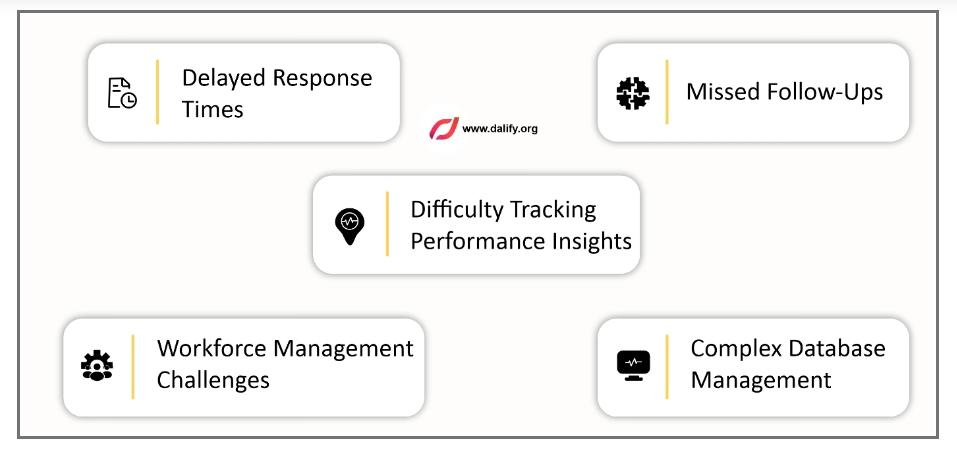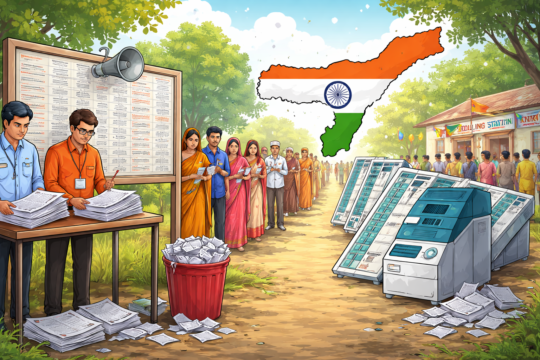The case study demonstrates how Tour and Travel Industry benefits from smart automation softwares like Dalify Lead Management Software by creating operational improvements, replacing all the manual processes along with cost reductions and satisfied customers management
Since the beginning the travel industry has operated with multiple demanding tasks which include handling customer questions while creating travel itineraries. The quick development of technology now changes these difficulties mainly through the automated handling of what were previously manual procedures. Dalify Lead Management software together with its intelligent automation revolutionizes the approach to customer service and operational efficiency and closing rates of travel agencies.
The Problem: Manual processes and procedures cause efficiency to slow down.

The present system consisting of manual procedures causes efficiency issues. Traditional travel agencies experienced problems while they sought to effectively handle and convert their leads. Travel agencies experience several difficulties because their current practice involves traditional reporting and automation of inquiries and itinerary building that requires too much time along with human errors. Current organizational processes without a centralized system create opportunities for missed possibilities because they produce ineffective customer management and delayed responses. Lower conversion rates along with inefficiencies result in decreased profits for the agency.
Major problems encountered by stakeholders :
• Poor lead tracking: Several agencies fail to manage incoming leads efficiently and they consequently lose valuable opportunities because of delayed responses.
• Time-consuming itinerary making: The process to create customized travel plans through manual methods extends into multiple hours which results in customer delays and potentially forfeited sales.
• Disorganized customer data: Agencies encounter challenges with customer data organization because they operate without a unified CRM system which results in a difficulty to provide tailored service.
• No automation: The combination of manual follow-up activities with lead nurturing functions causes businesses to lose opportunities through the procedural shortcomings of human personnel.
The rise of smart automation:
Commercial automation technologies like Dalify make their debut. Its modern lead management systems operating through advanced technology enabling travel agencies to perform automated operational processes. Customers experience improved satisfaction at higher conversion rates because agents benefit from machine-processed improvements which speed up service delivery.
How smart automation comes into action:
• Automatic Lead Assignment: The predetermined rules in smart systems allow automatic assignment of leads so agents receive them faster and teams receive work more effectively.
• Automated Follow-Ups: An automated notification system and follow-up system tracks all leads through reminders to prevent any lead from being forgotten. The lead management system automatically ensures quick responses from agents which prevents opportunities from disappearing.
• Instant Itinerary Generation: Employers can produce itineraries instantly through their systems which before required manual creation over hours. Travel agencies now use their system to create personalized itineraries instantly thus cutting down response durations which leads to happier customers.
• Real-Time Analytics: Strategic business plan optimization occurs through real-time performance analysis of agency data which lets managers measure both productivity numbers and satisfaction ratings simultaneously.

The result : Enhancement in services and reduction in costs.
Operational efficiency improvements in the travel industry through automation serve twofold purposes by both benefitting customers and employees. Customers receive timely responses coupled with rapid delivery of customized travel plans and better relationship maintenance through personalized messages by travel agencies which implement automated systems.
Practical benefits observed:
• Faster Response Times: The implementation of automated systems enables agencies to provide service at quicker rates which enhances their efficiency in customer need fulfilment.
• Higher Conversion Rate Optimization (CRO): Better booking conversion rates for agencies originating from customer inquiries with the combination of enhanced lead management together with follow-up systems.
• Improved Customer Retention: Organized customer information combined with automated follow-ups generates personalized services which lead to elevated customer retention and additional booking and repeat customer rates.
Budget friendly: A market-surviving advantage for recent start-ups
The major profit driver from automated systems in travel lies in their expense efficiency. New automated lead management products now offer a single buyout instead of subscription-based models that traditional CRM systems usually require. Technology democratization allows micro-travel agencies to obtain sophisticated tools that do not require perpetual subscription payments.
Smaller agencies now have the opportunity to adopt sophisticated CRM and lead management tools because this transition has made the previous high costs unaffordable for them thus enabling them to achieve better efficiency. Proper technological solutions allow smaller agencies to perform as competently as larger companies do.
The aftermath: An improvement in Tour and Travel Industry
The implementation of smart automation programs in lead management stands as the initial step toward greater changes in the industry. The progress of technological advancement creates growing potential improvements within the travel industry. Travel agencies will experience the development of improved technology solutions providing detailed customer analysis and enhanced automatic processes for bookings and service operations.

The development of automation technologies will introduce greater ease of use between travel agents and their customers in upcoming years. Travel platforms controlled by artificial intelligence deliver automated itineraries and their future represents millions of automated possible solutions for customer service.
Conclusion: Welcoming technology to become a tough competitor.
Currently the travel industry faces digital transformation as an industry alongside others. Smart automation transforms lead management procedures through the automation of manual workflows which enables operational optimization and better satisfaction levels for customers and agencies. Travel agencies implementing these technologies enhance their operational efficiency along with creating future success in a market that grows more competitive.
Travel industry growth through automation integration during daily operations will create the future direction of the industry where agencies deliver top-tier customer experiences.
Author’s bio: Saraf Ali is a software engineer, an author and a compulsive storyteller. Everything that happens to him, everything he sees or reads, suggests a story. ‘The Smile Worth A Billion Poems’ was a collection of his teenage musings (late 2017). Two years after, he had to leave his home to go live in a distant city, alone, the result of which was the book, ‘Triggered Sorrows’. He can be reached at sarafali101@gmail.com















